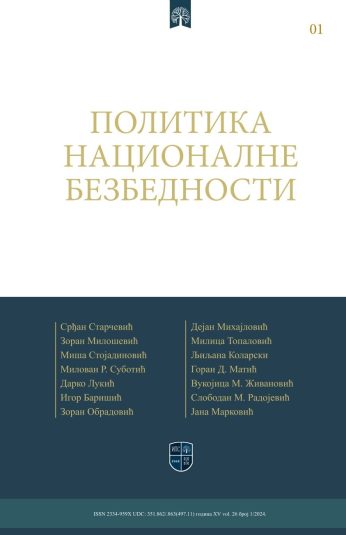RETURN OF COMPULSORY MILITARY SERVICE IN EUROPE: SOCIAL DETERMINISM AND PERSPECTIVES
In the period between 1995 and 2012, a number of European countries suspended mandatory military service upon which European national standing armies were based, from the 19th to the end of the 20th century. The Second Crimean crisis, which yielded the renewed . . .
SOCIAL SCIENCES AND NATIONAL SECURITY
The contribution of social sciences and humanities to the security of people, society and the state is a little studied topic. It goes without saying that every member of society, especially scientists, should contribute to security, primarily through the . . .
IRREGULAR MIGRATIONS AS A CHALLENGE TO REGIONAL AND NATIONAL SECURITY
After a decade-long duration of robust migratory movements towards Europe, it can be asserted that the response, in the form of a continuous disposition against migration, is primarily rooted in the perceived cultural threat. Immigrants are viewed as unassimilable, . . .
THE SIZE, SHAPE AND BORDERS OF SERBIA AS ESSENTIAL FACTORS IN THE SECURITY CHALLENGES OF THE REPUBLIC OF SERBIA
The paper discusses the size, shape and borders as a factor in the security of the territory of the Republic of Serbia. The illegal secession of Kosovo and Metohija represents an important security challenge that affects in a qualitative and quantitative sense . . .
ASYMMETRIC THREAT TO THE SECURITY OF THE REPUBLIC OF SERBIA: THEORETICAL FRAMEWORK FOR THE ANALYSIS OF PROBLEMS IN KOSOVO AND METOHIA
The application of the concept of asymmetry in the domain of security enables a comprehensive overview of the strategic relations between the opposing parties, as well as the methods used by the adversaries in an effort to turn this type of inequality into . . .
THE POTENTIAL OF THE ANTI-HEGEMONIC COALITION
The authors consider the potential of a loose coalition in curbing US global influence, ie. the implications of its formation and strengthening on the final establishment of multipolarity. Based on the view that international relations are increasingly defined . . .
WHEN THE HOME BECOME A BATTLEFIELD - FEMICIDE AND THE NATIONAL SECURITY OF THE REPUBLIC OF SERBIA
Femicide, as the most extreme form of gender-based violence, has been highlighted as a special social and security problem in the Republic of Serbia in recent years. Statistical data support the fact that over a ten-year period, more than three hundred women . . .






